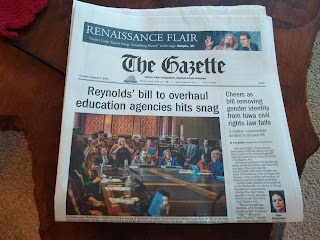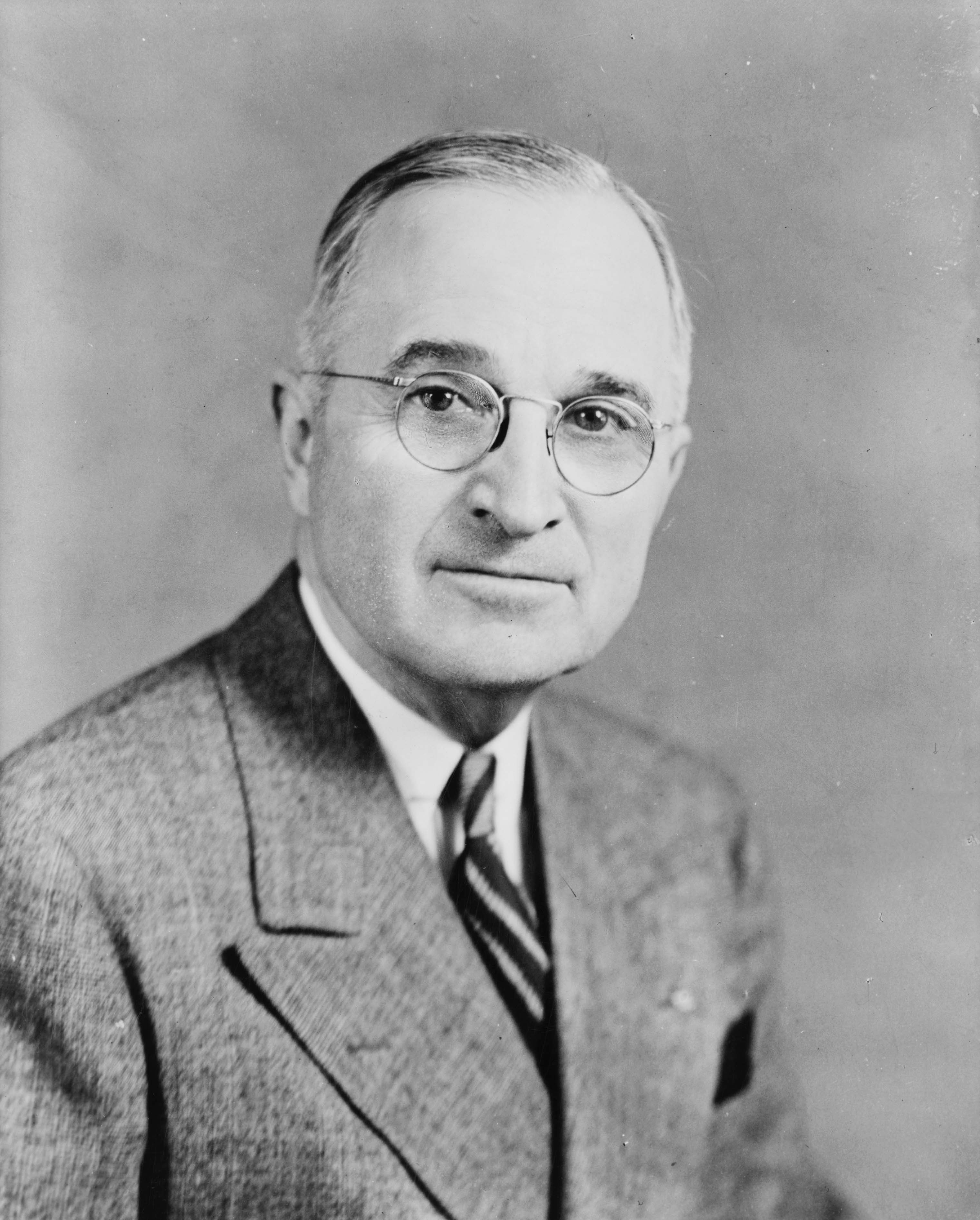(President Harry S. Truman, an advocate of national health insurance.)
It's been a tough week for the Affordable Care Act, the health care reform law passed in 2010 and currently in the implementation phase. A
Politico story (see below for link) validated a spurious claim that has been making the rounds in the last year, to wit, that members of Congress are seeking to exempt themselves from provisions of the law mandating purchase of insurance from purchasing exchanges. President Obama is being criticized by members of his own party for lack of leadership and failure to communicate on health care, with Montana Senator Max Baucus saying "I just see a huge train wreck coming down" as the law is implemented. And Friday Caroline Humer of Reuters news agency reported few insurance companies are enrolling in the state-level insurance exchanges, which makes it questionable whether those exchanges will be able to operate as intended.
The exemption falsehood is the latest in a series of fact-free efforts to manipulate public opinion, dating back to Sarah Palin's 2009 crusade against putative "death panels," and even farther back to hoary charges of "socialized medicine." However, unlike death panels, which theoretically could have been in the law even though they weren't, the exemption story is fundamentally absurd. The law doesn't affect people with insurance, as long as the insurance plan itself qualifies. Members of Congress, who have very good health insurance, aren't exempt from a requirement to buy insurance that they're already buying. And even those required to buy insurance aren't required to buy it from exchanges.
So what is giving this lie legs? As should be obvious to anyone, some people really really really want this law to fail. This certainly includes former Pennsylvania Republican Senator Rick Santorum, whose 2011 presidential campaign appearances in Iowa featured lengthy tirades against the law. When I saw him speak at Mt. Pleasant, he claimed that America ceased to be a free country when the law was passed; he wondered why we're helping people get health care when we don't help them get food and housing (um, actually, we do); and raged against longer waiting times in doctors' offices. Swell guy, that Santorum, and no wonder he's pushing the exemption story to the max this week. If you're as angry about it as he is, which hardly seems humanly possible, write an angry letter your representative and send
Santorum's group some money.
(Former Pennsylvania U.S. Senator Rick Santorum, whose public
persona is angry, and inaccurate to boot.)
That doesn't explain how the congressional exemption falsehood got into
Politico, though. John Harwood of
The New York Times points out, "In fact, lawmakers said, the talks the article referred to concerned preserving the same kind of employer-subsidized health coverage for Congressional employees that workers at private companies can receive under the law." I've sent a query to the lead author of the
Politico story. He hasn't responded, nor has
Politico issued a clarification or correction. I'll let you know if that changes.
The other criticisms are harder to assess. In an ideal world, the Obama administration, and particularly the President, would be noting that we're embarking on quite the grand social experiment, and issuing regular public statements of information and reassurance. But I don't know how reasonable it is to expect that, given that other stuff keeps coming up, like the civil war in Syria or the bombings in Boston, that have to be addressed, too. More basically, I'm pretty sure people overestimate the effectiveness of even focused presidential rhetoric. There is a lot of noise in the world of politics, more and more each week it seems, and even if the President's is the loudest voice in the country it still gets drowned out more often than not. There need to be more people involved in this effort besides Obama and Secretary Sibelius. Is Baucus helping?
It would be nice if the health insurers were feeling confident and enthused, too. Given that we've never done this sort of thing before as a country, some degree of uncertainty is inevitable. Nothing Obama says or does can undo that. Could the government do a better job of cushioning the insurers against whatever it is they're worried about? Maybe. Given that insurers were very much a part of the bill's formulation in 2009--if anything provider groups were too involved in the process, because few members of Congress were willing to negotiate their votes--you'd think this would have come up. But let us grant that at least some of the insurers' concerns are legitimate. Those should be addressed. Insurers should not, however, be indemnified against any conceivable loss or inconvenience. This isn't about them.
Health insurance is important to the central question of this blog: how are we Americans going to live together? Between 15 and 20 percent of adults 18-65 are without health insurance at any given point in time; expanding that point to a year, or two years, the percentage gets larger, as different people get and lose insurance. (Up-to-date numbers from the Kaiser Family Foundation
here.) That number would, I'm sure, at least double and maybe triple or more, if we change the subject to
underinsurance, that is, having insurance that does not adequately protect a person against medical emergencies. This is not a trivial matter. People without insurance have significantly higher incidence of major health problems, less consistent care, shorter life expectancies, and much more vulnerable finances. (For data see Katherine Swartz's chapter, cited below, and the sources she cites in endnotes 3-10. There is also
a 2008 study by the Urban Institute.) Bottom line: Health insurance is critical to equality of opportunity. It matters very much whether people have it or not. It is not, as Justice Scalia suggested in his dissenting opinion, a luxury item that is purchased by people who have made it economically. It is, for the past 30 years anyway, a significant demarcation between the "haves" in our society and the "have-nots."
Moreover, to the extent that uninsured and underinsured people get their medical care in emergency rooms, it raises health costs for everyone. Did Senator Santorum ever wonder, if they're not paying the cost of emergency care, who is? Did he ever wonder if someone in his family would have a medical emergency and have to wait for uninsured people who got there first?
I support implementation of the Affordable Care Act, if only because it is the only game in town. It is the only means currently available that will address the critical problem of uninsured and underinsured people. Single-payer is not on the table. And Republicans, for all their full-throated opposition to "Obamacare," have offered nothing in the way of alternative methods once they achieve their goal of repealing it. Indeed, several G.O.P. senators, including Iowa's Charles Grassley, who were engaged in health care talks with the administration in 2009, fled as soon as the Tea Party turned up the heat that August. Once in awhile, Paul Ryan or someone will pop up with a suggestion, but do these ever get committee hearings or floor votes in the Republican-controlled House of Representatives? There have been over 30 votes to repeal the Affordable Care Act; how about something of substance?
Moreover, the style of reform enacted in the Affordable Care Act has worked, at the state level, in Massachusetts. Massachusetts is not America, of course; its population is overall better-educated and had a higher proportion of insured people before its health care law was enacted in 2005. Perhaps most importantly, implementation of health reform in Massachusetts was facilitated by cooperation between Republican Governor Mitt Romney, legislative Democrats, and provider groups.
The Massachusetts experience shows that health care reform can work. For sure there will be problems along the way, but those can and will be overcome if people in power work together to overcome them. On the other hand, with enough fear-mongering, misinformation, and foot-dragging, the Affordable Care Act can very well be effectively undermined. Obama's legacy would suffer, people would have even less faith that government can do anything right, insurance companies could do things the hugely profitable way they've always done them, and maybe the rest of us would enjoy shorter waits for doctor visits. Maybe those would all be good things. But those are picayune matters, compared with the opportunity to what we need to do: make people more healthy, promote economic opportunity, and keep America from becoming even more divided than it already is.
SOURCES
John Bresnahan and Jake Sherman, "Lawmakers, Aides, May Get Obamacare Exemption,"
Politico, 24 April 2013,
http://www.politico.com/story/2013/04/obamacare-exemption-lawmakers-aides-90610.html.
John Harwood, "The Next Big Challenge for Obama's Health Care Law: Carrying It Out,"
New York Times, 30 April 2013, A10.
Caroline Humer, "U.S. Insurers Wary of Health Reform,"
The Gazette (Cedar Rapids, IA.), 2 May 2013, 1A, 8A.
Robert Pear, "Obama Says Health Care Law Is 'Working' and Changes Won't Be Widespread,"
New York Times, 1 May 2013, A15.
Katherine Swartz, "Uninsured in America: New Realities, New Risks," in Jacob S. Hacker (ed),
Health at Risk: America's Ailing Health System--And How to Heal It (Columbia, 2008), 32-65.
ALSO WORTH A LOOK...
Linda Bergthold, "Obamacare: Will the Trains Run on Time?"
HuffingtonPost.com, 30 April 2013,
http://www.huffingtonpost.com/linda-bergthold/obamacare-will-the-trains_b_3189634.html: soberly positive expectations for implementation
Bill Keller, "Five Obamacare Myths,"
New York Times, 16 July 2012,
http://www.nytimes.com/2012/07/16/opinion/keller-five-obamacare-myths.html?src=me&ref=general&_r=0... somewhat dated, but a useful reminder of the junk that was circulating last summer
Glenn Kessler, "Obama's Claim that 90 Percent of Americans 'Don't Have to Worry' about 'Obamacare,"
WashingtonPost.com, 30 April 2013,
http://www.washingtonpost.com/blogs/fact-checker/post/obamas-claim-that-90-percent-of-americans-dont-have-to-worry-about-obamacare/2013/04/30/01414c02-b1f7-11e2-9a98-4be1688d7d84_blog.html: how Obama has exaggerated claims for the benign impact of the Affordable Care Act. Particularly Kessler points out that the underinsured, whom Obama has overlooked in his speeches on the subject this week, will need to get better insurance, which will cost 'em.






















